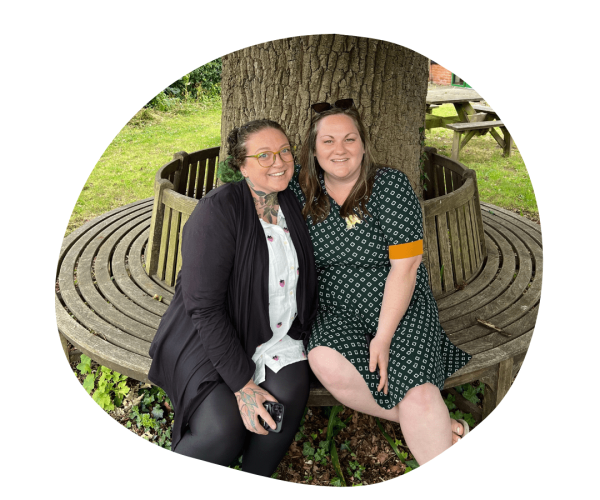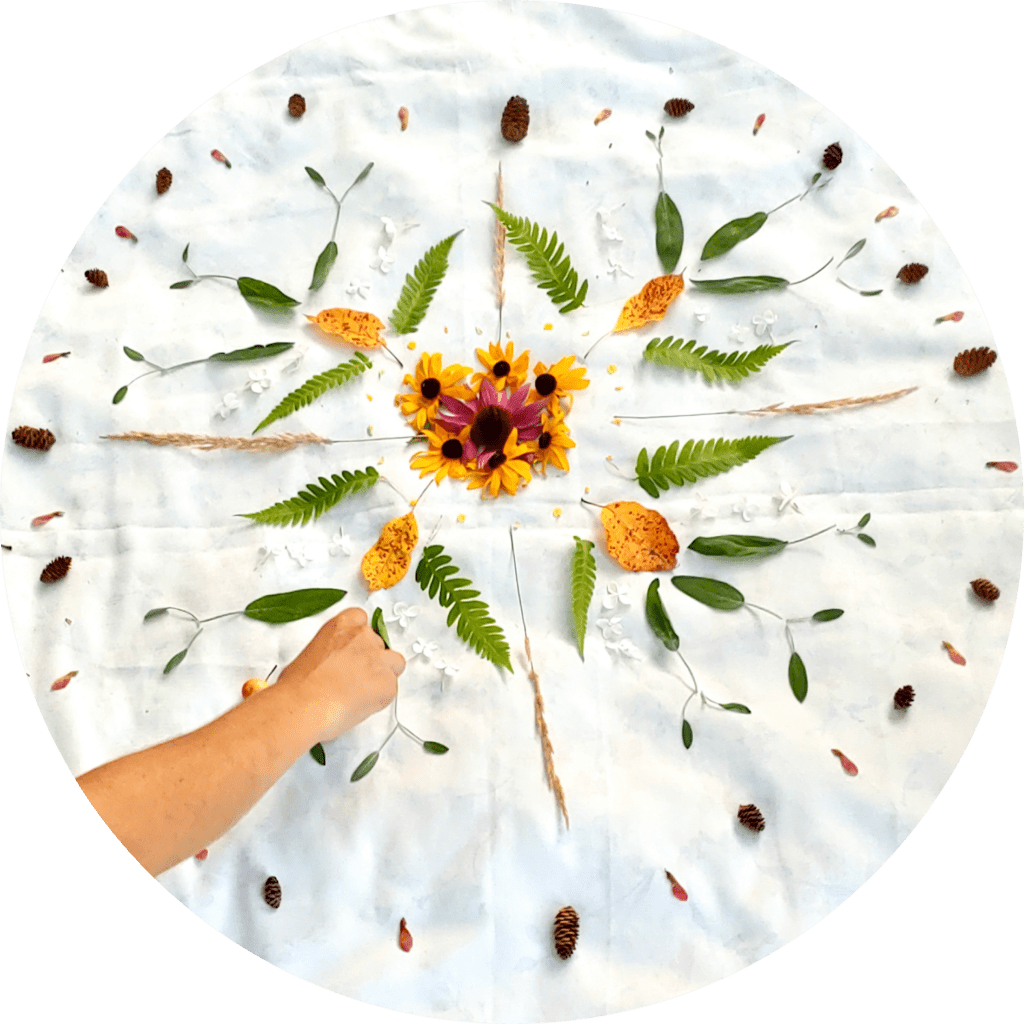Gardening for Wellness:
A Virtual Therapeutic Horticulture Experience
Series Summary
This virtual therapeutic horticulture series – led by Katie McGillivray, HTR, and Kristin Topping – blends practical gardening skills with a focus on personal well-being. Sessions cover topics like Seed Starting, Gardening with Kitchen Scraps, Indoor Plant Care & Self Care, Colour in the Garden, and more.
Along the way, you’ll explore gardening techniques, interactive activities, mindful invitations, and reflective prompts. Whether you’re an experienced gardener or just beginning, this self-paced journey offers a supportive way to deepen your connection with nature—and yourself.

Pictured here from left: Kristin Topping and Katie McGillivray, HTR at the Thrive UK gardens.
Session Topics
Session 1: Seed Starting 101
Learn the basics of successful seed starting, including growing mediums, lighting, watering, and budget-friendly upcycled materials. You’ll also explore how to choose the right seeds for your space and goals, and get tips for transplanting and avoiding common issues like leggy seedlings.
Session 2: Indoor Plant Care and Self Care
Discover how caring for indoor plants can support your own well-being. Learn practical tips for plant care, from fertilizing and repotting to pruning and leaf cleaning, plus guidance on choosing the right plants for your space and lifestyle.
Session 3: Gardening with Kitchen Scraps
Learn how to regrow fresh food from everyday kitchen scraps like celery and green onions. This session offers practical tips for growing from waste, along with the benefits and challenges of this simple, eco-friendly practice, whether on your countertop or in the garden.
Session 4: Practical Garden Techniques
Learn practical gardening methods like companion planting, succession planting, and mulching to make the most of your space and support a healthy, sustainable garden. Get tips on soil health, water conservation, and choosing techniques that match your garden’s needs.
Session 5: The Power of Colour in the Garden
Explore how colour impacts mood and garden design, with tips on using colour theory to guide plant choices and layout. Learn about vibrant edible and ornamental plants, and how to create natural dyes from your garden.

Registration
$79 USD
$59 USD – full-time students
This series includes:
- Five virtual 50 minute co-facilitated sessions
- 10 Mindful invitation videos
- Personalized completion certificate
- Downloadable resources and activities, including:
- Seed Starting Best Practices
- Office Plant Cheat-Sheet
We love hearing from you!
Meet Your Experience Leads

Katie McGillivray, HTR
Katie (she/her) is a Registered Horticultural Therapist (HTR) a member of the Canadian and American Horticultural Therapy Associations. A strong advocate of asset-based community development and reflective practice, Katie has been supporting therapeutic horticulture projects and programs for a wide variety of populations since 2014.
Katie completed her horticultural therapy certificate with Ann Kent and completed a minor in counselling and majoring in general studies, focusing on courses in horticulture, agriculture, psychology and research. Katie is passionate about increasing access to therapeutic horticulture in communities and facilitates regular in-person and virtual sessions. Her approach is collaborative, client-centred and strengths-based.
Katie is also a major foodie and her work in therapeutic horticulture often intersects with community food security and food justice work. When not in the garden, Katie loves cooking, entertaining and paddle boarding.

Kristin Topping
Kristin (she/her) is a twenty-two-year veteran of the Canadian Armed Forces where she achieved success as an engineer, academic and educator. She retired in July 2020, opening Sweetlife Flora, an e-commerce tropical plant shop. With each year that Sweetlife Flora has been open, the team has tailored and curated their operations becoming more eco-friendly by reducing their annual cumulative carbon footprint.
Her first book, Propagated from the Ashes, chronicled her recovery from a significant brain injury that shifted her life’s direction, focus and purpose. In 2021, Kristin was the recipient of the prestigious Prince’s Trust International, Aga Khan Foundation Group Award– and had the opportunity to meet the future King of England.
Now, aside from running Sweetlife Flora, Kristin is also a Horticulturalist, a Horticulture Therapy Practitioner and is a few months away from completing training as a Landscape Designer. She has a passion for the ‘Permaculture Movement’ and intends to use her knowledge to encourage responsible land management through efficient use of human energy, sustainability, and self-reliance.
Kristin’s interest in community-based horticulture began with her own journey to recovery and she hopes to extend the gift of Mindful Horticulture® to others.
FAQs
This experience is for anyone looking to connect with themselves and nature, enhance their gardening skills, and promote personal well-being. No prior gardening experience is required.
Yes, we offer this series live for groups as part of employee wellness programs or for organizations like adult day programs. For more information or to schedule a session, please reach out to Alexis at alexis@rootinnature.ca.
Yes! If more than five people would like to join the series as a group, please contact us at courses@rootinnature.ca to arrange a discount code.
Many insurance policies now offer a more flexible ‘wellness fund’ that can cover a range of therapies. It may be worth inquiring whether this therapeutic horticulture series qualifies for coverage.
Some employers provide health and wellness funds. You might consider requesting coverage for this series. We provide a detailed receipt for reimbursements.
Yes! Please see our student rate above. This is available to full-time students only.

Join the Community
Benefits for Clients
Benefits for Clients
Practitioners can benefit from using plants and nature in their therapeutic approach in several ways:
- Enhancing the environment: Plants and nature create a calming and relaxing environment that can promote wellness and enhance the overall atmosphere of a therapy session.
- Reducing stress: Exposure to plants and nature has been shown to reduce stress and anxiety levels, which is beneficial for individuals who are experiencing mental health conditions or chronic illnesses.
- Improving physical health: Spending time in nature and around plants can promote physical activity and exercise. Recreation therapists can incorporate therapeutic horticulture activities into their therapy sessions to promote physical health.
- Boosting mood: Being in nature and around plants can boost mood and help individuals feel more positive and optimistic. This can be especially helpful for individuals who are experiencing depression or other mood disorders.
- Promoting social connections: Group therapeutic horticulture sessions can provide opportunities for social interaction and connection, as well as promote bonding and create a sense of community.
Benefits for Practitioners
Benefits for Practitioners
Practitioners such as recreation therapists may benefit from taking therapeutic horticulture training for several reasons:
- Specialized knowledge: Root in Nature’s training program provides specialized knowledge and skills related to using plants, gardening, and nature as therapeutic tools. This can help recreation therapists better understand the therapeutic benefits of horticulture and how to effectively incorporate it into their therapy sessions.
- Professional development: Training in therapeutic horticulture can be a valuable form of professional development for practitioners. It can enhance their skills and knowledge, making them more effective in their role as a therapist.
- Expanded therapy options: With therapeutic horticulture training, recreation therapists can expand the range of therapy options they can offer their clients. Incorporating plants and nature into their sessions can provide clients with unique and effective therapeutic experiences.
- Improved client outcomes: Horticultural therapy has been shown to be effective in improving a range of outcomes for clients, including mental health, physical health, and overall quality of life. By taking Root in Nature’s training, recreation therapists can learn how to effectively use horticulture to improve their clients' outcomes.

